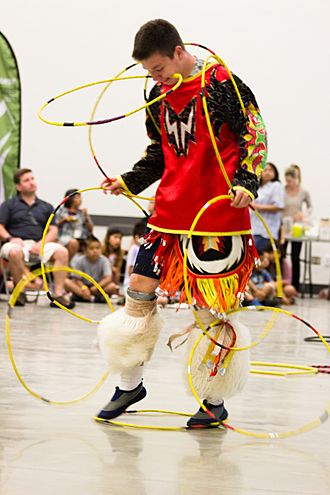National Indigenous Peoples Day facts for kids
Quick facts for kids National Indigenous People's Day |
|
|---|---|

National Aboriginal Day celebrations at University of the Fraser Valley, 2015
|
|
| Observed by | Canada |
| Date | 21 June |
| Next time | 21 June 2026 |
| Frequency | annual |
National Indigenous Peoples Day is a special day in Canada. It celebrates the amazing cultures and important contributions of the First Nations, Inuit, and Métis peoples. These are the original inhabitants of Canada.
The day was first celebrated in 1996. It was officially announced by the Governor General of Canada at the time, Roméo LeBlanc. He said it should be celebrated every year on June 21. This date was chosen for many reasons. It's often the Summer solstice, which is the longest day of the year. Many Indigenous groups traditionally celebrate their heritage around this time.
In 2017, there was a plan to officially change the name to National Indigenous Peoples Day. Even though the law to make this change didn't pass yet, the Canadian government has started using the new name.
This day is a public holiday in the Northwest Territories since 2001 and in Yukon since 2017. However, it is not a public holiday in the rest of Canada.
History of the Day
This special day came about because many people asked for a celebration like it.
In 1945, a leader named Jules Sioui and other chiefs from across Turtle Island (which is another name for North America) first declared it Indian Day.
Later, in 1982, a group called the National Indian Brotherhood (now known as the Assembly of First Nations) asked for a "National Aboriginal Solidarity Day" to be held on June 21.
Then, in 1995, a group called the Royal Commission on Aboriginal Peoples suggested that a "National First Peoples Day" should be created. In the same year, a big meeting led by Elijah Harper also asked for a national holiday to celebrate the contributions of Indigenous peoples to Canada.
National Indigenous Peoples Day is now the first of several "Celebrate Canada" days. These days include the National Holiday of Quebec on June 24, Canadian Multiculturalism Day on June 27, and Canada Day on July 1.
In 2001, the Northwest Territories became the first place in Canada to make this day an official public holiday. They passed a law called the National Aboriginal Day Act.
On June 21, 2017, the Prime Minister of Canada, Justin Trudeau, said he would change the name to National Indigenous Peoples Day. The head of the Assembly of First Nations, Perry Bellegarde, supported this change. He called it an "important step." He mentioned that the new name matches the language used in the United Nations' Declaration on the Rights of Indigenous Peoples.
A proposed law to change the name officially was discussed in the Senate. However, it did not pass before the government changed. Even so, the Canadian government has started using the name National Indigenous People's Day in its official documents.
See also
- Treaty Day (Nova Scotia)
- International Day of the World's Indigenous Peoples
 | DeHart Hubbard |
 | Wilma Rudolph |
 | Jesse Owens |
 | Jackie Joyner-Kersee |
 | Major Taylor |

